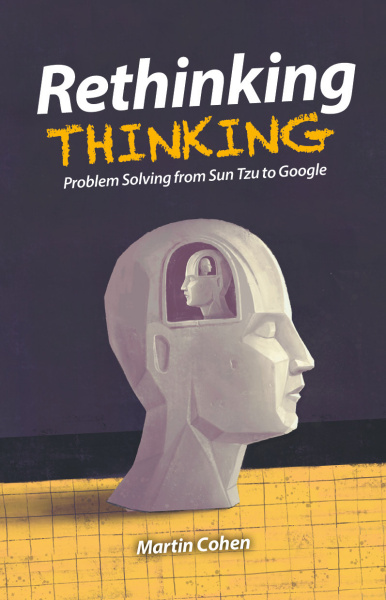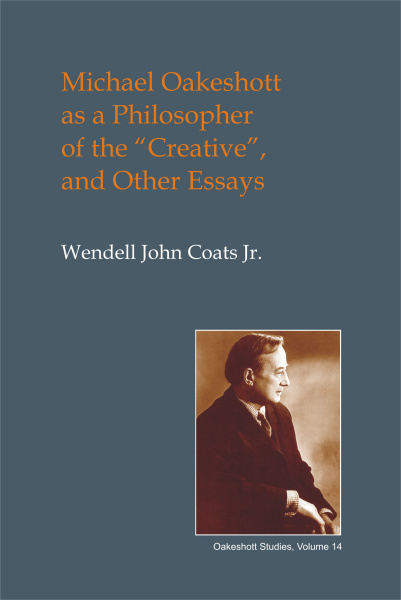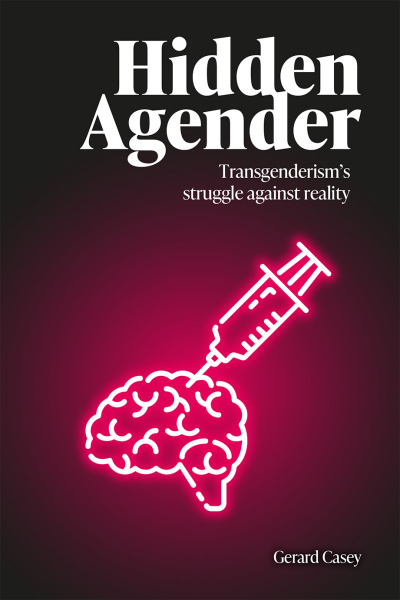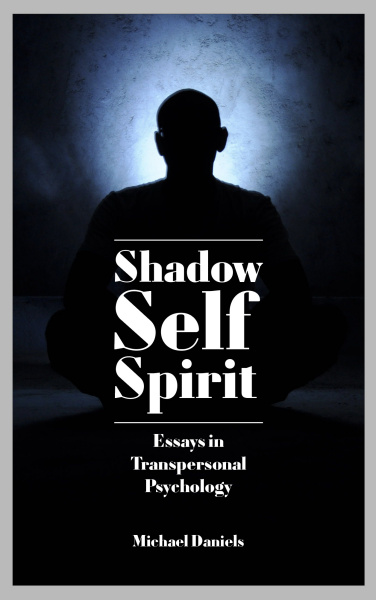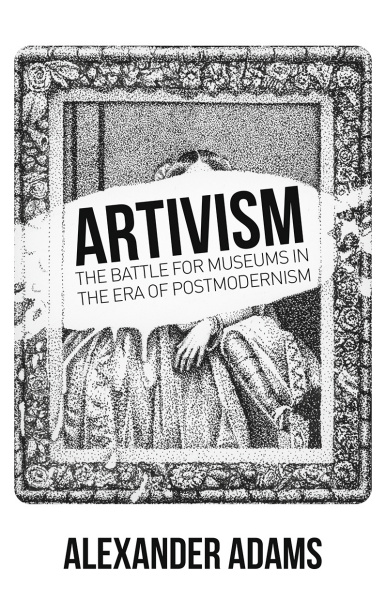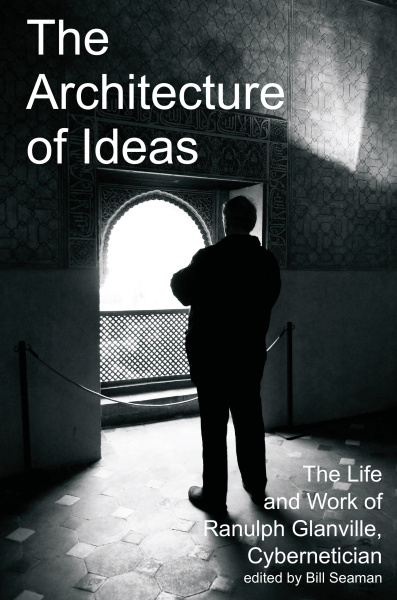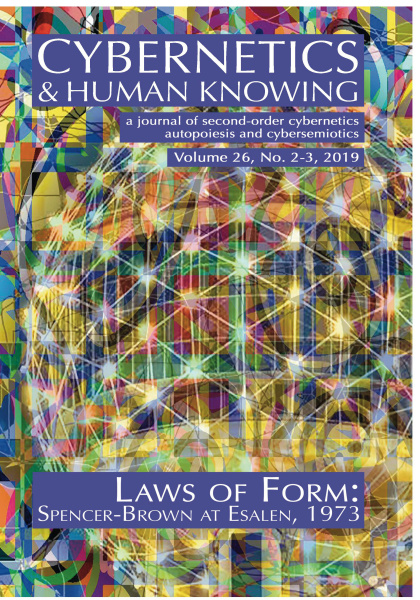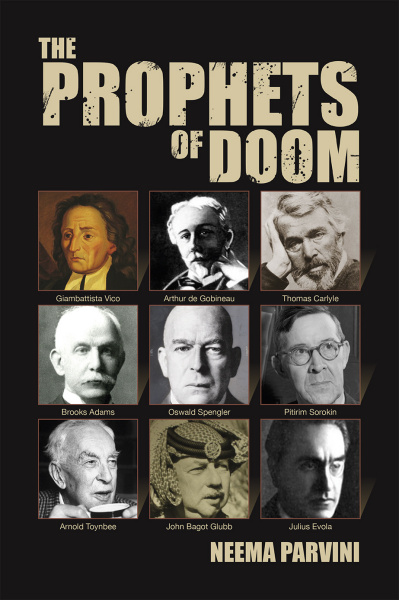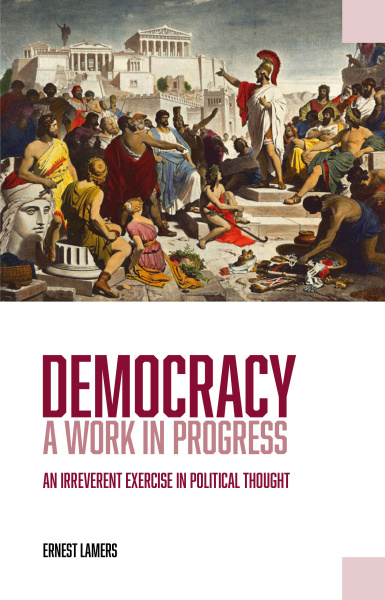Imprint Academic
-

Why Context Matters
Or, Where Did Anglo-American Philosophy Go Wrong?
This book argues that the institutionally sanctioned contrast between allegedly legitimate philosophy and its spurious continental counterpart became entrenched thanks to two intertwined metaphysical presuppositions at the heart of positivism.
-

Unknowable Minds
Philosophical Insights on AI and Autonomous Weapons
Unknowable Minds delves into the unsettling reality of entrusting our safety to an intelligence that lacks human essence. The book explores how AI differs from any technology we've ever developed, its inherent complexities, and the profound risks it poses to our future.
-

Ancient Evenings
Nine Pyrrhonian Dialogues
Ancient Evenings is a study of consciousness presented as a series of fictional philosophical dialogues - on good and evil, truth and falsehood, life and death - set at the height of the Roman Empire.
-

Consciousness and Its Place in Nature
Why Physicalism Entails Panpsychism (2nd Ed.)
Galen Strawson has been on the front line of the battlefield on the topic of panpsychism since the 1990s. This new edition of this seminal book (originally published in 2006) contains several new postscripts on the topic of panpsychism, and Strawson's 'realistic monism' in particular.
-

Mary Catherine Bateson
Compositions in Living Cybernetics
This collection of essays from authors representing a range of disciplines from anthropology to design to creativity and spirituality, as well as transdisciplinary perspectives that are at the heart of cybernetics, honours Mary Catherine Bateson's life and work.
-

Humberto Maturana
Reflections on Bringing Forth Worlds
This volume is grounded in a deep appreciation of the rich and cohesive constellation of ideas developed by Humberto Maturana which, taken as a whole, can be understood as a biocultural matrix of human understanding.
-

The Hope of the Poor
Philosophy, Religion and Economic Development
Is economic development the best hope for the world's poor? This book aims to add a philosophical dimension to the debate about this question. The author argues in favour of replacing quantitative assessments of wealth and poverty with a qualitative account of the ways in which human lives can be enriched or impoverished.
-

The Tango of Ethics
Intuition, Rationality and the Prevention of Suffering
A key paradigm in The Tango of Ethics is the conflict and interplay between two fundamentally different ways of seeing and being in the world — that of the intuitive human being who wants to lead a meaningful life and thrive, and that of the detached, rational agent who wants to prevent unbearable suffering from occurring.
-

Is Consciousness Everywhere?
Essays on Panpsychism
This volume, originally a special issue of the Journal of Consciousness Studies, uses the recent writings of Philip Goff as a jumping-off point for discussions of panpsychism — the idea that consciousness is a fundamental and pervasive aspect of our universe that cannot be understood in other, more basic, terms.
-

The Past is a Future Country
The Coming Conservative Demographic Revolution
The Past is a Future Country shows how a resistant class of intelligent, religious conservatives will band together to preserve enclaves of our currently failing civilization — a failing civilization caused by a rejection of traditional values and an epidemic of narcissists who compete to signal their individuality and moral superiority.
-

The Architecture of Ideas
The Life and Work of Ranulph Glanville, Cybernetician
This book contains a collection of writings related to the work of Ranulph Glanville. The editor, Bill Seaman, includes a piece titled 'Composing Composing' which explores a number of Glanville's texts. Also included is an interview with Glanville titled 'A Long Conversation', and a text by Aartle Hulstein, Ranulph's wife.
-

Character and Virtues
10 Years of the Jubilee Centre
This book captures the key areas of focus of the Jubilee Centre's work over the past ten years. It would be of interest to those who have followed any part of the Jubilee Centre’s journey since 2012, as well as researchers into character and virtues and character educators in schools and universities.
-

Idealism & Experience
The Philosophy of Guido de Ruggiero
Idealism & Experience: The Philosophy of Guido de Ruggiero comprises eight new critical essays, as well as English translations of five of de Ruggiero's most important shorter writings, which chart the development of his thought between 1914 and 1946.
-

Quality of Life
A Post-Pandemic Philosophy of Medicine
The Covid-19 pandemic has shown the need for a fresh look at health and health care. This book offers a philosophical critique of medicine as applied science, but more positively it stresses the social causes of disease and argues for greater equity in the distribution of resources and the benefits of a wider evidence-base for medical treatments.
-

Selfhood, Autism and Thought Insertion
This book, a reprint of a special issue of the Journal of Consciousness Studies, highlights some excellent examples of the complex nature of first-person thoughts as they figure in linguistics, autism, thought insertion in schizophrenia, and the phenomenon of mental autonomy.
-

The Rupture
On Knowledge and the Sublime
This book views the sublime as the radically other, revealing to us our own finitude, and compares it with ideas of negative theology and post-modernism. Fane argues that art and religion attempt to break through the 'hermeneutic circle of knowledge', turning sleepwalkers into people who are alive to an (unknowable) truth.
-

British Idealism and International Thought
The Development of Human Rights
This book gives a comprehensive account of the British Idealist approach to international relations from the 1880s to 1930s. In an attempt to historically contextualise the shifts in several British Idealists' approaches to the nature of international relations and human rights, it focuses on on the 2nd Boer War, WWI and the League of Nations.
-

Laws of Form: Spencer-Brown at Esalen, 1973
This Special Issue of Cybernetics and Human Knowing contains rare material related to G. Spencer-Brown's book Laws of Form and its contents. In 1973 there was a conference at Big Sur at which Spencer-Brown discussed his calculus with a group of scientists. In this issue we print Walter Barney’s transcripts of the conference.
-

Myth, Meaning, and Antifragile Individualism: On the Ideas of Jordan Peterson
Jordan Peterson has attracted a high level of attention. Focusing on Peterson's ideas rather than controversies, this book explores his answers to perennial questions. Champagne unites the different strands of Peterson's thinking in a handy summary and then articulates his main critical concerns.
-

ZAP
Free Speech and Tolerance in the Light of the Zero Aggression Principle
In ZAP, Gerard Casey presents a critical and unified approach to both free speech and tolerance based on the Zero Aggression Principle, keeping the critical discussion topical and grounded by reference to current events.
-

Michael Oakeshott as a Philosopher of the "Creative"
And Other Essays
This book is a collection of eight essays on the work of the twentieth-century English philosophic essayist, Michael Oakeshott. Six of them advance the view in different ways that Oakeshott's multifarious lifework may be understood as variations on a singular insight — that the structure of experiential reality is 'creative' or 'poetic'.
-

The Life and Philosophy of Elizabeth Anscombe
This volume in the St Andrews series contains a collection of essays from leading authors regarding the work of Elizabeth Anscombe, in particular issues in mind and metaphysics, and can be considered a partner work to 2016's The Moral Philosophy of Elizabeth Anscombe (also published by Imprint Academic).
-

Lady Mary Shepherd
Selected Writings
A collection of works published by Lady Mary Shepherd, brought together in one volume with an introduction by the editor and published as part of the Library of Scottish Philosophy series.
-

Immigration Control in a Warming World
Realizing the Moral Challenges of Climate Migration
In the 21st century, climate change is projected to increase the already significant immigration pressures that rich countries in Europe and North America face. However, the willingness of citizens in destination countries to let further foreigners immigrate is unlikely to keep pace with that increase. These issues are discussed in this book.
-

Laws of Form
Commentary and Remembrance for George Spencer-Brown
This volume is a collection of articles on themes related to the book Laws of Form by George Spencer-Brown.
-

Michael Oakeshott: Notebooks, 1922-86
The sixth volume in the series Michael Oakeshott: Selected Writings. From the 1920s to the 1980s Oakeshott filled dozens of notebooks with his private reflections, both personal and intellectual. Their contents range from aphorisms to miniature essays, forming a unique record of his intellectual trajectory over his entire career.
-

Thomas Reid on Religion
This volume — a companion to Thomas Reid: Selected Philosophical Writings (2012) — makes available material from Thomas Reid's autograph manuscripts and student notes of his lectures. It includes an introductory essay by Nicholas Wolterstorff.
-

Freedom's Progress?
A History of Political Thought
Freedom's Progress is a history of Western political thought, a conceptual map as it were, tracking the fitful journey of one particular concept — liberty — through time. The book covers the full philosophical canon — from Plato to Rawls — but is written from the perspective of the libertarian tradition of Ludwig von Mises and Murray Rothbard.
-

The Many Faces of Coincidence
The Many Faces of Coincidence proposes an inclusive categorisation for coincidences of all shapes and sizes. At the same time, some of the implications arising from the various explanations are explored, including the possibility of an underlying unity of mind and matter constituting the ground of being.
-

Get Over Yourself
Nietzsche for Our Times
Get Over Yourself both uses Nietzsche's philosophy to understand our society, and takes our society to explain his philosophy.
-

The Place of Michael Oakeshott in Contemporary Western and Non-Western Thought
Essays by contributors from Britain, Canada, Hong Kong, India, and the USA provide a comprehensive critical assessment of the principal aspects of Oakeshott's thought that account for his contemporary relevance.
-

A Guide to the Classics
Or How to Pick the Derby Winner
A Guide to the Classics is a light-hearted manual on how to pick the Derby winner. This long-awaited edition of Griffith and Oakeshott's classic text includes a new preface and foreword by horse racing journalist and author Sean Magee, and political commentator Peter Oborne.
-

Art, Morality and Human Nature
Writings by Richard W. Beardsmore
This collection brings together the text of the monograph Art and Morality by the philosopher Richard Beardsmore along with fourteen other essays (both published and previously unpublished) in which he explores further some of the themes of his seminal book.
-

Lord Kames
Selected Writings
Library of Scottish Philosophy volume containing selected writings of Henry Home, Lord Kames, judge, jurist and philosopher.
-

What is Wrong with Us?
Essays in Cultural Pathology
The pieces collected in this volume are not presented as amounting to an overall account or theory of our cultural condition. They are offered merely as examples of serious criticism, of what we need if we are to begin to think more profitably about our condition.
-

The Singularity
Could artificial intelligence really out-think us (and would we want it to)?
Volume combining two special issues of the Journal of Consciousness Studies on the philosophical aspects of a possible artificial intelligence singularity.
-

Insides and Outsides
Interdisciplinary Perspectives on Animate Nature
Insides and Outsides brings together diverse aspects of animate nature, showing that scientific understandings of animate nature are — or can be — complementary to philosophical understandings.
-

Ranulph Glanville and How to Live the Cybernetics of Unknowing
A festschrift issue of Cybernetics and Human Knowing focusing on the work of Ranulph Glanville, cybernetician, design researcher, theorist, educator and multi-platform artist/designer/performer.
-

The Moral Philosophy of Elizabeth Anscombe
In this collection of new essays deriving from a conference held in Oxford aspects of Elizabeth Anscombe's moral philosophy are examined. Anyone interested in Anscombe's work all want to read this volume.
-

Spinoza
Basic Concepts
Spinoza: Basic Concepts explores key concepts involved in Spinoza's thinking, relating it to his understanding of philosophy, outlining the arguments and explaining the implications of each concept. Together, the chapters cover the full range of Spinoza’s interdisciplinary system of philosophy.
-

Logic, Truth and Meaning
Writings of G.E.M. Anscombe
This fourth and final volume of writings by Elizabeth Anscombe reprints her Introduction to Wittgenstein's Tractatus, together with a number of later essays on thought and language in which she explores issues of reason, representation, truth and existence.
-

Paradigm Shift
How expert opinions keep changing on life, the universe, and everything
This book offers vital clues for understanding not only the way knowledge develops, but also into the dangers of accepting too readily or too uncritically the claims of experts of all kinds — even philosophical ones! The claims are invariably presented as objective fact, yet are rooted in human subjectivity.
-

Social Radicalism and Liberal Education
The book examines why social radicals supported liberal education, why they have moved away from it, and what the implications are for the future of an intellectually stimulating and culturally literate education.
-

Thought Thinking
The Philosophy of Giovanni Gentile
This book comprises eleven essays on Gentile's thought. Seven of these are new pieces written especially for Thought Thinking, supplemented by new English translations of four of Gentile's shorter works, selected to offer some direct insight into his ideas and style of writing.
-

The Decision Trap
Genetic Education and Its Social Consequences
The Decision Trap questions a dogma of our time: the assumption that genetic education empowers citizens and increases their autonomy.
-

Orwell's Faded Lion
The Moral Atmosphere of Britain 1945-2015
This book confronts the actual direction taken by British society against the background of the high hopes of the generation that survived the war.
-

Giovanni Gentile and the State of Contemporary Constructivism
A Study of Actual Idealist Moral Theory
Giovanni Gentile and the State of Contemporary Constructivism represents the first book-length treatment of actual idealist moral theory.
-

Educating Character Through Stories
This book argues that the narratives and stories of great literary works are of neglected significance and value for contemporary understanding of human moral association and character.
-

The Legendary Past
Michael Oakeshott on Imagination and Political Identity
The book explores Oakeshott's thought on the key role human imagination plays in relation to the political.
-

Global Philosophy
What Philosophy Ought to Be
This book is about education, learning, rational inquiry, philosophy, science studies, problem solving, academic inquiry, global problems, wisdom and, above all, the urgent need for an academic revolution.
-

Francis Hutcheson
Selected Philosophical Writings
Known today mainly as a teacher of Adam Smith (1723–90) and an influence on David Hume (1711–76), Francis Hutcheson (1694–1746) was a first-rate thinker whose work deserves study on its own merit. Spanning his entire literary career, this collection brings together selections from Hutcheson's greater and lesser known works.
-

The Unleashed Scandal
The End of Control in the Digital Age
In an age of ubiquitous digital media and permanent mutual observation scandals are omnipresent. This books describes recent case-(hi)stories, discussing public figures such as Tiger Woods and Anthony Weiner, the powerful and the helpless that suddenly find themselves in a worldwide pillory.
-

Scottish Philosophy of Rhetoric
The selected writings chosen for this volume show how Scottish rhetorical textbooks were a practical extension of the philosophy of language developed by 18th century Scottish philosophers.
-

How Universities Can Help Create a Wiser World
The Urgent Need for an Academic Revolution
In this lucid and provocative book, Nicholas Maxwell argues convincingly that we need urgently to bring about a revolution in universities round the world so that their basic aim becomes wisdom, and not just knowledge.
-

History as Thought and Action
The Philosophies of Croce, Gentile, de Ruggiero and Collingwood
This is the first book-length study of the relationship between Benedetto Croce (1866-1952), Giovanni Gentile (1875-1944), Guido de Ruggiero (1888-1948) and Robin George Collingwood (1889-1943).
-

General Will in Political Philosophy
This book deals with the role and place of the general will in modern and contemporary political thought.
-

Global Modernity
And Other Essays
This group of essays follows a similar eclectic pattern to that found in Tom Rubens' previous essay-collections published by Imprint Academic. The author's aim is to appeal widely but also succinctly: in a way that will stimulate readers to develop their own thoughts on, and consult more extensive treatments of, the subjects in question.
-

A Philosopher and Appeasement
R.G. Collingwood and the Second World War
The two volumes of A Philosopher at War examine the political thought of the philosopher and archaeologist, R G Collingwood, against the background of the First and Second World Wars.
-

Oakeshott on Rome and America
This book explores how the histories of Rome and America can help us to understand Oakeshott's claims about rational versus traditional politics.
-

Civil Society, Capitalism and the State
Part Two of the Liberal Socialism of T.H. Green
This book presents a critical reconstruction of the social and political facets of Thomas Hill Green's liberal socialism. It builds on Colin Tyler's The Metaphysics of Self-realisation and Freedom (2010), although it can also be read as a freestanding work.
-

Thomas Reid
Selected Philosophical Writings
The aim of this comprehensive selection of his writings is to make the key elements of Reid's philosophical work available to a new generation of readers.
-

Scottish Philosophy in America
The Scottish Enlightenment provided the fledgling United States of America and its emerging universities with a philosophical orientation. This volume in the Library of Scottish Philosophy demonstrates the remarkable extent of this philosophical influence.
-

The Philosophy of Punishment
In this volume, the author sets aside the usual division between theories of punishment that do or do not focus on retribution. In its place he proposes and explores the distinction between internalist and externalist theories.
-

A Philosopher at the Admiralty
R.G. Collingwood and the First World War
This book is volume one of a two-part series (volumes sold separately). Taken together, the two volumes of A Philosopher at War examine the political thought of the philosopher and archaeologist, R.G. Collingwood, against the background of the First and Second World Wars.
-

Politics and Neo-Darwinism
And other essays
This collection of essays is eclectic, covering certain political, ethical, cultural and philosophical topics. But running through all the material is the evolutionary-naturalistic perspective stated in the opening essay.
-

Natural Law, Economics and the Common Good
In this volume a distinguished set of authors explore various economic, philosophical, and ethical ideas from historical, contemporary, and future-looking perspectives.
-

Meaning in Communication, Cognition and Reality
Outline of a Theory from Semiotics, Philosophy and Sociology
This book presents a general and formal theory of meaning, signs, and language. The theory is presented in a clear and consistent way offering novel and provocative insights into the fundamental structures and processes of communication, cognition, and reality.
-

Friendship and the Political
Kierkegaard, Nietzsche, Schmitt
This book reappraises the idea of "friendship" in contemporary political thought. The author explores the possibilities for theorising friendship in modern times through an examination of three seminal thinkers: Kierkegaard, Nietzsche and Schmitt.
-

The Meanings of Michael Oakeshott's Conservatism
This collection of recent scholarship on the thought of Michael Oakeshott includes essays by both distinguished and established authors as well as a fresh crop of younger talent. Together, they address the meanings of Oakeshott's conservatism through the lenses of his ideas on religion, history, and tradition.
-

From Plato to Wittgenstein
Essays by G.E.M. Anscombe
More treasures from the archive of papers left by philosopher Elizabeth Anscombe, edited by her daughter and son-in-law, philosophers Mary Geach and Luke Gormally.
-

Pluralism and the Mind
This book argues that new concepts of emergent mental properties are needed because of the failure of mainstream approaches satisfactorily to address issues like subjective volition, autonomy and creativity. Personal consciousness is active and classifiable as a subset of the wider problem of biological causation.
-

James Frederick Ferrier
Selected Writings
This volume contains selections from the philosophical writings of James Frederick Ferrier (1808-1864). Ferrier was the Professor of Moral Philosophy at the University of St Andrews between 1845 and 1864 and he was one of the earliest post-Hegelian British idealists.
-

Avatar-Philosophy (and -Religion) Or FAITHEISM
Are you prepared, either as an atheist or a religious believer, to have your ideas of God, the self, other people, the body, the soul, spirituality, and faith challenged in an unexpected and original way? Here is a book that moves out from under and away from the received notions of those ponderous topics, whether or not you believe in the divine.
-

Understanding Teaching and Learning
Classic Texts on Education by Augustine, Aquinas, Newman and Mill
Generous selections from these four seminal texts on the theory and practice of education have never before appeared together in a single volume.
-

Truth and Faith in Ethics
This addition to the St Andrews Studies series contains a wide-ranging collection of essays on all aspects of moral philosophy and its impact upon public life in the twent-first century.
-

Speciesism, Painism and Happiness
A Morality for the 21st Century
Richard Ryder created the term speciesism in early 1970 and shared the idea with Peter Singer, who popularised it in his classic work Animal Liberation (1975).
-

On Liberty and Peace Part 2
Peace
The author writes: In this project I set out to provide an answer to two fundamental questions of political philosophy. How can human beings live together, in conditions of co-operation over time, enjoying what Kant famously called 'perpetual peace'? And how much individual freedom can we expect to enjoy?
-

The Scientific Metaphysics of Charles S. Peirce
This collection of articles investigates central themes and difficulties in the metaphysics of C.S. Peirce.
-

Situated Aesthetics
Art Beyond the Skin
This book focuses on externalist approaches to art. It is the first fruit of a workshop held in Milan in September 2009, where leading scholars in the emerging field of psychology of art compared their different approaches using a neutral language and discussing freely their goals.
-

On Being Someone
A Christian Point of View
This book continues the discussions in "What a piece of work: on being human" (Imprint Academic 2006) and may be considered its sequel. In this volume the author leaves aside comparisons with our fellow creatures in order to attend to our own experience.
-

The Happy Passion
A Personal View of Jacob Bronowski
Bronowski was a professional scientist, scientific administrator, poet, philosopher, dramatist and TV and radio personality. His final achievement, the groundbreaking television series The Ascent of Man influenced and inspired millions of ordinary people by bringing an awareness of human evolution and the adventure of science into their homes.
-

The Authentic Tawney
A New Interpretation of the Political Thought of R.H. Tawney
This book provides a fresh and accessible guide to the ideas of R.H. Tawney for new readers and to set straight the record of what Tawney's political thought really is, warts and all, in place of the rather over-simplified picture painted by the major commentators.
-

The Creation of Reality
A Constructivist Epistemology of Journalism and Journalism Education
In this book, Bernhard Poerksen draws up a new rationale for constructivist thinking and charts out directions for the imaginative examination of personal certainties and the certainties of others, of ideologies great and small.
-

Michael Oakeshott: Early Political Writings 1925-30
A discussion of some matters preliminary to the study of political philosophy' and 'The philosophical approach to politics
This volume contains two previously unpublished works, a manuscript entitled 'A Discussion of some Matters Preliminary to the Study of Political Philosophy', and the first version of a course of lectures on 'The Philosophical Approach to Politics' that Oakeshott gave between 1928 and 1930.
-

The Metaphysics of Self-realisation and Freedom
Part One of the Liberal Socialism of Thomas Hill Green
This first part of Colin Tyler's new critical assessment of the social and political thought of T.H. Green (1836–1882) explores the grounding that Green gives to liberal socialism.
-

Evolving Ethics
The New Science of Good and Evil
This book describes the application of Artificial Life simulation to evolutionary scenarios of wide ethical interest, including the evolution of altruism, rape and abortion, providing a new meaning to "experimental philosophy".
-

The Legacy of Leo Strauss
This volume of essays opens up the topic of Leo Strauss and the Straussians to those outside the relatively narrow circles who have been concerned with him and his followers up to now.
-

The Earth Is Our Home
Mary Midgley's critique and reconstruction of evolution and its meanings
This book demonstrates that Mary Midgley's philosophy of evolution points the way towards considering the earth as our only true home, since we are products of this planet and its evolving and complex life along with every other organism.
-

Thomas Brown
Selected Philosophical Writings
The selections in this volume illustrate Brown's original ideas about mental science, cause and effect, emotions and ethics. They are preceded by an introduction situating Brown’s career and writings in their intellectual and historical context.
-

On Liberty and Peace, Part 1
Liberty
The author writes: In this project I set out to provide an answer to two fundamental questions of political philosophy. How can human beings live together, in conditions of co-operation over time, enjoying what Kant famously called 'perpetual peace'? And how much individual freedom can we expect?
-

Reforming Science
Beyond Belief
This volume is an attempt to reform science, to place science in its broad historical and philosophical context where dogmatic belief has no place, to remind science itself that it has limitations.
-

Economic Reform and a Liberal Culture
And Other Essays on Social and Cultural Topics
This second collection of essays for the Societas series by Tom Rubens continues the author's discussion of contemporary issues contained in "Progressive Secular Society" (Imprint Academic 2008).
-

Sensibility and Sense
The Aesthetic Transformation of the Human World
Sensibility and Sense offers a philosophically comprehensive account of humans' social and cultural embeddedness encountered, recognized, and fulfilled as an aesthetic mode of experience.
-

Partial Memories
Sketches from an Improbable Life
Autobiographical sketches by the philosopher and semioticist Ernst von Glasersfeld.
-

Transdisciplinary Cybernetics and Cybersemiotics
The guiding idea behind this collection of papers is a presentation of the transdisciplinary scope of the new semiotics offering a deeper and broader framework than the structuralist semiology.
-

The Foundations of History
Collingwood's Analysis of Historical Explanation
This book provides an exposition and critical examination of Collingwood's philosophy of history, in which Collingwood's views are read in the light of his metaphilosophy.
-

Hobbes's Behemoth
Religion and Democracy
This volume contains analyses and interpretations of the Behemoth: the structure of its argument, its relation to Hobbes's other writings, and its place in its philosophical, theological, political, and religious historical context.
-

Profit, Prudence and Virtue
Essays in Ethics, Business and Management
Essays in the ethics of business and management.
-

Practical Philosophy
Ethics, Society and Culture
In this wide ranging volume of philosophical essays John Haldane explores some central areas of social life and issues of intense academic and public debate.
-

Moral, Social and Political Philosophy of the British Idealists
The British idealists of the late 19th and early 20th century are best known for their contributions to metaphysics, logic, and political philosophy. Yet they also made important contributions to social and public policy, social and moral philosophy and moral education, as shown by this volume.
-

The Concept of a Philosophical Jurisprudence
This volume brings together for the first time over a hundred of Oakeshott's essays and reviews, written between 1926 and 1951, that until now have remained scattered through a variety of scholarly journals, periodicals and newspapers.
-

The School of Freedom
A liberal education reader from Plato to the present day
Liberal education is a term that has fallen from use in Britain, its traditional meaning now freely confused with its opposite. This book is intended to correct that misapprehension, through the presentation of original source material from the high points in the liberal education tradition with particular focus on the British experience.
-

Here For Our Children's Children?
Why we should care for the earth
This study reviews the many different bases for wanting to preserve the environment. By seeing how protagonists approach the same situation from different assumptions, some of the origins of environmental conflict may be established, and ways of resolving conflict can be identified.
-

Darwinian Conservatism
A Disputed Question
A reprint of Larry Arnhart's essay Darwinian Conservatism with comment and criticism from a variety of contributors.
-

Understanding Faith
Religious Belief and Its Place in Society
A philosophical discussion of religion and its place in society. The book will examine the nature of faith and of the attacks upon it; considering both external and internal criticism - from non-believers and between believers.
-

Self and Society
Studies in the Evolution of Culture
A series of essays on the evolution of culture, dealing with topics including the city and consciousness, evolution of the afterlife, literary and mathematical archetypes, machine consciousness and the implications of 9/11, and the invasion of Iraq.
-

Unlearning
Or how NOT to be governed?
The aim of this book is to show why we should hold 'unlearning' to be a crucial ‘capability’ in and for education at this point in our history.
-

The Democratic Theory of Michael Oakeshott
Discourse, Contingency and the Politics of Conversation
This book offers a description, explanation, and evaluation of Michael Oakeshott's democratic theory. He was not a democratic theorist as such, but as a twentieth-century English political theorist for whom liberal theory held deep importance, his thought often engaged democratic theory implicitly, and many times did so explicitly.
-

Subjectivity and Being Somebody
Human Identity and Neuroethics
This book uses a neo-Aristotelian framework to examine human subjectivity as an embodied being. It examines the varieties of reductionism that affect philosophical writing about human origins and identity.
-

Vocabulary of a Modern European State
Essays and Reviews 1953-1988
The Vocabulary of a Modern European State is the companion volume to The Concept of a Philosophical Jurisprudence and completes the enterprise of gathering together Oakeshott's previously scattered essays and reviews.
-

The Woman Racket
The new science explaining how the sexes relate at work, at play and in society
Notwithstanding its provocative title, The Woman Racket is a serious scientific investigation into one of the key myths of our age – that women are oppressed by the 'patriarchal' traditions of Western societies.
-

Faith in a Hard Ground
Essays on Religion, Philosophy and Ethics
Elizabeth Anscombe's forthright philosophy speaks directly to many religious and ethical issues of current concern.This collection of her essays forms a companion volume to the critically acclaimed Human Life, Action and Ethics published in 2005.
-

Liberty, Authority, Formality
The essays in this volume are all inspired by the historical scholarship of J.C. Davis. Davis's analyses of groups like the Levellers and individuals like Gerrard Winstanley and Oliver Cromwell has reoriented the inquiry around the contemporary moral themes of liberty, authority and formality -- around which concepts this volume engages.
-

Seeking Meaning and Making Sense
Collection of short essays that range across philosophy, politics, general culture, morality, science, religion and art, focusing on questions of meaning, value and understanding.
-

Progressive Secular Society
And other essays relevant to secularism
This book gives a set of 'secular thoughts for the day' – many only a page or two long – on topics as varied as Shakespeare and Comte, economics, science and social action.
-

Liberalism, Education and Schooling
Essays by T.M. McLaughlin
A tribute collection of essays edited by author's colleagues and friends.
-

The Landscape of Humanity
Art, Culture and Society
The fourteen essays in this book develop a conception of human culture, which is humane and traditionalist.
-

Enemies of Progress
Dangers of Sustainability
This polemical book examines the concept of sustainability and presents a critical exploration of its all-pervasive influence on society, arguing that sustainability, manifested in several guises, represents a pernicious and corrosive doctrine that has survived primarily because there seems to be no alternative to its canon.
-

Michael Oakeshott, the Ancient Greeks, and the Philosophical Study of Politics
This book addresses a question fundamental for Oakeshott throughout his life, which is what we are doing when we read and discuss some memorable work in the history of political thought.
-

Luhmann Applied
This book brings together international experts on the application of Niklas Luhmann's theory of society as autopoietic communication.
-

In Bed with Madness
Trying to make sense in a world that doesn't
In Bed with Madness is 'a well-argued, powerful and profound indictment of contemporary culture', stylishly written – a reviewer said he would have bought it just for its humour!
-

The Future of the Past
From the culture of profit to the culture of joy
Universalism in its old forms has, just like door-to-door milkmen, gone for good. But the search for some universally accepted ethical standards cannot be abandoned. Looking into our world from the classical Greek point of view, Yannis Andricopoulos wonders whether we cannot place Justice again at the heart of our morality.
-

Froude Today
A.L. Rowse called fellow-historian James Anthony Froude the 'last great Victorian awaiting revival'. The question of power is the problem that perplexes every age: in his historical works Froude examined how it applied to the Tudor period, and defended Carlyle against the charge that he held the doctrine that ‘Might is Right’.
-

Collingwood and the Crisis of Western Civilisation
Art, Metaphysics and Dialectic
This book argues that Collingwood's philosophy is best understood as a diagnosis of and response to a crisis of Western civilisation. He is demonstrated to be working in the traditions of Romanticism and 'historicism'.
-

Universities
The Recovery of an Idea
Using some themes of Cardinal Newman's classic The Idea of a University as a springboard, this extended essay aims to address the problems of modern universities.
-

Unpublished Manuscripts in British Idealism
Political Philosophy, Theology and Social Thought
The British Idealist movement flourished between the 1860s and 1920s and exerted a very significant influence in the USA, India and Canada, most notably on John Dewey and Josiah Royce. This important collection widens access to unpublished material by transcribing, editing and then publishing the most significant pieces.
-

Forgiveness
How Religion Endangers Morality
In his book The Moral Case against Religious Belief (1997), the author argued that some important virtues cease to be virtues at all when set in a religious context, and that a religious life is, in many respects, not a good life to lead. In this sequel he takes up the theme again.
-

Joseph Conrad Today
This book argues that the novelist Joseph Conrad's work speaks directly to us in a way that none of his contemporaries can. Conrad's scepticism, pessimism, emphasis on the importance and fragility of community, and the difficulties of escaping our history are important tools for understanding the political world in which we live.
-

Histories and Discourses
Rewriting Constructivism
Siegfried J. Schmidt is closely associated in Germany with the cross-disciplinary research programme of Radical Constructivism. In Histories & Discourses he carries out a change of perspective from media and communication studies to studies of culture and the philosophy of language.
-

Education and the Voice of Michael Oakeshott
The work of Michael Oakeshott has retained a striking currency in philosophical discourse about education. In the light of this continuing interest and of Oakeshott's extensive writing on so many aspects of education, it is timely that a book be published on his thinking on the subject.
-

Adam Ferguson
Selected Philosophical Writings
A philosopher and historian, Adam Ferguson occupies a unique place within eighteenth-century Scottish thought. Distinguished by a moral and historical bent, his work is framed within a teleological outlook that upholds the importance of action and virtue.
-

Politics and Society in Scottish Thought
This volume illustrates the way political and social philosophers of 18th-century Scotland tried to answer the following question: 'What is, and what ought to be, the relationship between the modern market and stable, desirable social order?'
-

Scottish Philosophical Theology
This volume concentrates on the period from the beginning of the 18th century to the latter part of the 20th. It is impossible to depict a single school of philosophical theology in Scotland across three centuries, yet several strains have been identified.
-

John Grote, Cambridge University and the Development of Victorian Thought
This book answers three questions: How did John Grote develop and contribute to modern Cambridge and British philosophy? What is the significance of these contributions to modern philosophy in general and British Idealism and language philosophy in particular? How were his ideas and his idealism incorporated into the modern philosophical tradition?
-

Why Spirituality is Difficult for Westerners
Dr Hay is Honorary Senior Research Fellow at the University of Aberdeen. A zoologist by profession, his research has been guided by the hypothesis that religious or spiritual awareness is biologically natural to the human species and has been selected for in evolution.
-

Peirce and Spencer-Brown
History and Synergies in Cybersemiotics
This special double issue of Cybernetics and Human Knowing is comprised of a collection of papers devoted to the cybernetics and mathematics of Charles Sanders Peirce with a special focus on its synergies with George Spencer-Brown's thinking.
-

Making God
A New Materialist Theory of the Person
Developments in psychology mean that our view of persons is unlike the great teachers of the Axial Age -- the Buddha, Confucius, Zoroaster, etc. -- and therefore the God they made can no longer serve as ours. We have to make our own. So argues Ann Long in this fascinating exploration of personhood, religion and moral value.
-

Dugald Stewart
Selected Philosophical Writings
Dugald Stewart became one of the most influential academics in the eighteenth- and nineteenth-century European 'Republic of Letters'. This volume brings together some of Stewart's philosophical writings.
-

Dialectics of the Self
Transcending Charles Taylor
Charles Taylor is a philosopher concerned with morality and the nature of the identity of individuals and groups in the West. This book offers an evaluation of Taylor's conception of self, and its moral and political possibilities.
-

Earthy Realism
The Meaning of Gaia
GAIA, named after the ancient Greek mother-goddess, is the notion that the Earth and the life on it form an active, self-maintaining whole. With global warming now an accepted fact, the lessons of GAIA have never been more relevant and urgent.
-

Lectures in the History of Political Thought
Oakeshott's memorable lectures on the history of political thought, delivered each year at the London School of Economics, are now available in print for the first time as Volume II of his Selected Writings.
-

Intimations Pursued
The Voice of Practice in the Conversation of Michael Oakeshott
In this book Andrew Sullivan examines Oakeshott's transition from his original emphasis on philosophy as providing what was ultimately satisfactory in experience to his later emphasis on practical life.
-

Between Chance and Choice
Interdisciplinary Perspectives on Determinism
This volume collects essays by accomplished scientists and philosophers, addressing numerous facets of the concept of determinism. The contributions cover viewpoints from mathematics, physics, cognitive science and social science as well as various branches of philosophy.
-

Right Road to Radical Freedom
This work focuses on the topic of freedom. The author starts with the old issue of free will — do we as individual human beings choose our conduct, at least partly independently, freely?
-

Debating Humanism
This book features a cross-disciplinary dialogue among writers who are sympathetic to the humanist tradition and interested in developing a new humanist project through debate.
-

Life, Liberty, and the Pursuit of Utility
Happiness in Philosophical and Economic Thought
A volume on the nature, ingredients, causes and consequences of human happiness by the father and son team of Anthony and Charles Kenny.
-

Radical Externalism
Honderich's Theory of Consciousness Discussed
What is it for you to be conscious? To be conscious now, for instance, of the room you are in? Theories on offer divide into just two categories, labelled by Ted Honderich as devout physicalism and spiritualism.
-

What a Piece of Work
On Being Human
This is a small book on a large subject: What is special about human beings?
-

Philosophy of War and Peace
This book considers historical and current events from the standpoint of moral philosophy.
-

Human Life, Action and Ethics
Essays by G.E.M. Anscombe
This volume presents a collection of essays by the celebrated philosopher Elizabeth Anscombe. This collection includes papers on human nature and practical philosophy, together with the classic 'Modern Moral Philosophy'.
-

Putting Morality Back into Politics
Machiavelli almost succeeded in removing morality from European politics and, indeed, since his day it has sometimes been assumed that morality and politics are separate. Ryder argues that the time has come for public policies to be seen to be based upon moral objectives.
-

Mendacious Colours of Democracy
An Anatomy of Benevolent Lying
'Politics is a noble, but also a dirty, business. To gain election — and retain office — politicians are frequently compelled to be dishonest. They engage in benevolent lying because obstruction by stupid voters will otherwise stop them advancing the national interest as they see it.' So claims the author of this eye-opening book.
-

Moral Mind
A Study of What it is to be Human
The reality and validity of the moral sense — which ordinary people take for granted — took a battering in the last century. Haslam shows how important the moral sense is to the human personality and exposes the weakness in much current thinking that suggests otherwise.
-

Puritan Democracy of Thomas Hill Green
The central concern of this book is to demonstrate how Puritanism was a theme which ran through all Green's biography and political philosophy.
-

Darwinian Conservatism
This book suggests that Darwinian biology sustains conservative social thought by showing how the human capacity for spontaneous order arises from social instincts and a moral sense shaped by natural selection in human evolutionary history.
-

Gregory Bateson
Essays for an Ecology of Ideas
Gregory Bateson's work continues to touch others in fields as diverse as communication, ecology, anthropology, philosophy, family therapy, education, and mental/spiritual health. The authors in this special issue of Cybernetics & Human Knowing celebrate the Bateson Centennial.
-

Great Abdication
Why Britain's Decline is the Fault of the Middle Class
The middle class provides British society with its stability and strength. According to Deane's contentious thesis, our middle class has abstained from its responsibility to uphold societal values, and the enormously damaging collapse of our society’s norms and standards is largely a result of that abdication.
-

Creatures Like Us?
As a child brought up among animals, Lynne Sharpe never doubted they were essentially 'creatures like us'. It came as a shock to learn that others did not agree. Here she exposes the bizarre way in which many philosophers — including even some great and humane ones — have repeatedly talked and written about animals.
-

Religious and Poetic Experience in the Thought of Michael Oakeshott
This book argues that Oakeshott's characterisations of religious and poetic experience provide a more detailed account of the type of persona that emerged in response to what it perceived as an invitation to participate in moral association in the modern world.
-

From a Necessary Evil to an Art of Contingency
Michael Oakeshott's Conception of Political Activity
This book presents a comprehensive study of Oakeshott's conception of political activity. The author first examines Oakeshott in the contexts of liberal, conservative and Idealist thought, and then presents a detailed interpretation of the change in his conception of politics in the context of British postwar political thought.
-

Intellectual Legacy of Michael Oakeshott
This volume brings together a diverse range of perspectives reflecting the international appeal and multi-disciplinary interest that Oakeshott now attracts. The essays offer a variety of approaches to Oakeshott's thought.
-

Plain Person's Free Will
In this special issue of the Journal of Consciousness Studies David Hodgson defends a simple, robust account of the plain person's position on free will, and intends it to support equally robust views of personal responsibility for conduct.
-

T.H. Green's Theory of Positive Freedom
In this new and entirely revised edition of his study of Green's theory of positive freedom, Ben Wempe argues that the far-reaching and beneficial influence of Green’s political doctrine, on public policy as well as in the field of political theory, was founded on a misinterpretation of his philosophical stand.
-

Relativism and the Foundations of Liberalism
Moral relativism is often regarded as both fatally flawed and incompatible with liberalism. This book aims to show why such criticism is misconceived.
-

Paradoxical Primate
Human beings have an evolved but highly adaptable nature. This book sets out to establish a new framework for understanding human nature, from an evolutionary perspective but drawing on existing social sciences.
-

Values, Education and the Human World
The essays in this book consist of revised versions of Victor Cook Memorial Lectures.
-

Philosophy and Its Public Role
This brings together moral, social and political philosophers from Britain, Canada, New Zealand and the United States who explore a wide range of issues under the three headings of Philosophy, Society and Culture; Ethics, Economics and Justice; and Rights, Law and Punishment.
-

Snake That Swallowed Its Tail
Some Contradictions in Modern Liberalism
Tracing its effects through the media, politics and the public services, the author argues that hollowed-out liberalism has helped to produce our present discontent.
-

Adam Smith
Selected Philosophical Writings
This anthology collects, for the first time in one volume, not only generous selections from each of Smith's books but also substantial selections from his other work, including his lectures on jurisprudence, his history and philosophy of science, his criticism and belles lettres, and his philosophy of language.
-

Scottish Idealists
Selected Philosophical Writings
This collection of readings, the first of its kind, has been chosen with a view to displaying the variety, richness and strength of the Scottish Idealist tradition.
-

John MacMurray
Selected Philosophical Writings
The philosophy of John Macmurray is only now receiving the attention it deserves. It is in the contemporary climate of dissatisfaction with individualism that Macmurray's emphasis on the relations of persons has come to the fore.
-

James Beattie
Selected Philosophical Writings
The first part of this selection — the first ever made from Beattie's prose writings — includes several key chapters from the Essay on Truth, along with extracts from all of Beattie's other works on moral philosophy. The second part of the selection is devoted to Beattie's contributions to literary criticism and aesthetics.
-

Art and Enlightenment
Scottish Aesthetics in the 18th Century
This volume brings together and provides contextual introductions to the most significant 18th century writing on the philosophy of art.
-

Limits of Political Theory
Oakeshott's Philosophy of Civil Association
This book examines Oakeshott's political philosophy within the context of his more general conception of philosophical understanding. The book stresses the underlying continuity of his major writings on the subject and takes seriously the implications of understanding the world in terms of modality.
-

Greenian Moment
This study of T.H. Green views his philosophical opus through his public life and political commitments, and it uses biography as a lens through which to examine Victorian political culture and its moral climate.
-

Scottish Philosophy
Selected Writings 1690-1950
This collection of readings, the first of its kind, has been chosen with a view to displaying the variety, richness and strength of the Scottish philosophical tradition.
-

Francisco J. Varela 1946-2001
A volume dedicated to the life and work of Francisco Varela, this is an issue of the journal "Cybernetics and Human Knowing".
-

Thomas Sebeok and the Biosemiotic Legacy
Dedicated to the life and work of Thomas Sebeok, this is an issue of the journal "Cybernetics and Human Knowing".
-

Heinz Von Foerster 1911-2002
Dedicated to the life and work of Heinz Von Foerster, this is a double issue of the journal "Cybernetics and Human Knowing".
-

What is History? And Other Essays
Selected Writings
This highly readable new collection of thirty pieces by Michael Oakeshott, almost all of which are previously unpublished, covers every decade of his intellectual career.
-

Certainty of Uncertainty
Dialogues Introducing Constructivism
This book presents the views of the founders of constructivism and modern systems theory, who are still providing stimulating cues for international scientific debate. Throughout, the central figure of the observer is examined with sophisticated wit and just enough irritating grit to create the pearl in the oyster.
-

Action as History
The Historical Thought of R.G. Collingwood
This study shows how R.G. Collingwood's concepts of action and history developed together.
-

How Good an Historian Shall I be?
In this book Marnie Hughes-Warrington begins with the facet of Collingwood's work best known to teachers — re-enactment — and locates it in historically-informed discussions on empathy, imagination and history education.
-

Michael Oakeshott on Hobbes
While many commentators have noted the importance of Hobbes for understanding Oakeshott's thought itself, this is the first book to provide a systematic interpretation of Oakeshott’s philosophy by paying close attention to all facets of Oakeshott’s reading of Hobbes.
-

In Defence of Modernity
The Social Thought of Michael Oakeshott
Although Oakeshott's philosophy has received considerable attention, the vision which underlies it has been almost completely ignored. This vision, which is rooted in the intellectual debates of his epoch, cements his ideas into a coherent whole and provides a compelling defence of modernity.
-

Metaphysics, Method and Politics
The Political Philosophy of R.G.Collingwood
This book argues that Collingwood developed a complete political philosophy of civilization. It also demonstrates that his philosophical work comprises a unity in which there is no fundamental discontinuity between his earlier and later writings.
-

Physicalism and Mental Causation
This book presents a range of essays on the conceptual foundations of physicalism, mental causation and human agency.
-

T.H.Green and the Development of Ethical Socialism
This book uncovers the philosophical foundations of a tradition of ethical socialism best represented in the work of R.H. Tawney, tracing its roots back to the work of T.H. Green.
-

Liberty Option
The Liberty Option advances the idea that for compelling moral as well as practical reasons it is the free society -- with the rule of law founded on the principles of private property rights, its complete respect for individual sovereignty and properly limited legal authorities -- not one or another version of statism that serves justice best.
-

Oakeshott on History
This book challenges the common view that Michael Oakeshott was mainly important as a political philosopher by offering the first comprehensive study of his ideas on history.
-

Structure of Thinking
A Process-oriented Account of Mind
This book presents an alternative, naturalistic view of human thinking, arguing that computers are merely sophisticated machines.
-

Sceptical Idealist
Michael Oakeshott as a Critic of the Enlightenment
This is the first book-length study to provide a structured interpretation of the significance of Michael Oakeshott's critique of the Enlightenment.
-

Case Against the Democratic State
An Essay in Cultural Criticism
We are now so familiar and accepting of the State's pre-eminence in all things that few think to question it, and most suppose that democratic endorsement legitimizes it. The aim of this book is to present a compelling argument against both presumptions.
-

Philosophy and Living
Philosophy can be very abstract and apparently remote from our everyday concerns. In this book the author brings out for the non-specialist the bearing that thinkers of the past have on the way we live now, on the attitude we have towards our lives, towards each other and our society, towards God and towards the ethical problems that confront us.
-

God in Us
A Case for Christian Humanism
God In Us is a radical representation of the Christian faith for the 21st century. Following the example of the Old Testament prophets and the first-century Christians it overturns received ideas about God. God is not an invisible person 'out there' somewhere, but lives in the human heart and mind as 'the sum of all our values and ideals'.
-

Evolutionary Origins of Morality
Cross Disciplinary Perspectives
This volume includes four principal papers and a total of 43 peer commentaries on the evolutionary origins of morality.
-

Holding Up a Mirror
How Civilizations Decline
Using theatre as a measure society's health, this book shows that Ancient Greece and Rome, Medieval Christendom and our own contemporary society all follow the same pattern: prosperity thrives on the conviction that the material world alone constitutes true 'reality’; but that very conviction leads to a rejection of the supernatural.
